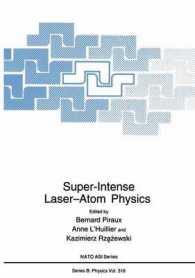- ホーム
- > 洋書
- > 英文書
- > History / World
Full Description
From the brink of dissolution in 1945 to the triumph of the Geneva Conventions in 1949, via the Nuremberg Trials, runaway Nazis, and furious battles with communist critics on the eve of the Cold War, this is the intriguing and remarkable story of the International Red Cross - and how it survived its ambiguous relationship with the Nazis during the Second World War.
The Geneva-based International Committee of the Red Cross (ICRC) is one of the world's oldest, most prominent, and revered aid organizations. But at the end of World War II things could not have looked more different. Under fire for its failure to speak out against the Holocaust or to extend substantial assistance to Jews trapped in Nazi camps across Europe, the ICRC desperately needed to salvage its reputation in order to remain relevant in the post-war world. Indeed, the whole future of Switzerland's humanitarian flagship looked to hang in the balance at this time.
Torn between defending Swiss neutrality and battling Communist critics in the early Cold War, the Red Cross leadership in Geneva emerged from the world war with a new commitment to protecting civilians caught in the crossfire of conflict. But they did so while defending former Nazis at the Nuremberg Trials and issuing travel papers to many of Hitler's former henchmen. These actions did little to silence the ICRC's critics, who unfavourably compared the 'shabby' neutrality of the Swiss with the 'good' neutrality of the Swedes, their eager rivals for leadership in international humanitarian initiatives.
In spite of all this, by the end of the decade, the ICRC had emerged triumphant from its moment of existential crisis, navigating the new global order to reaffirm its leadership in world humanitarian affairs against the challenge of the Swedes, and playing a formative role in rewriting the rules of war in the Geneva Conventions of 1949. This uncompromising new history tells the remarkable and intriguing story of how the ICRC achieved this - successfully escaping the shadow of its ambiguous wartime record to forge a new role and a new identity in the post-1945 world.
Contents
Introdution
1: The Birth of an Idea
2: The Silence on the Holocaust
3: Intervention and Opportunism
4: The Red Cross in Crisis
5: Between Geneva and Nuremberg
6: The ICRC and Aid Politics in Ruins
7: The Humanitarians and the Nazis
8: A Window of Opportunity
9: Towards the Geneva Conventions
Conclusion
Bibliography
Notes
Index








